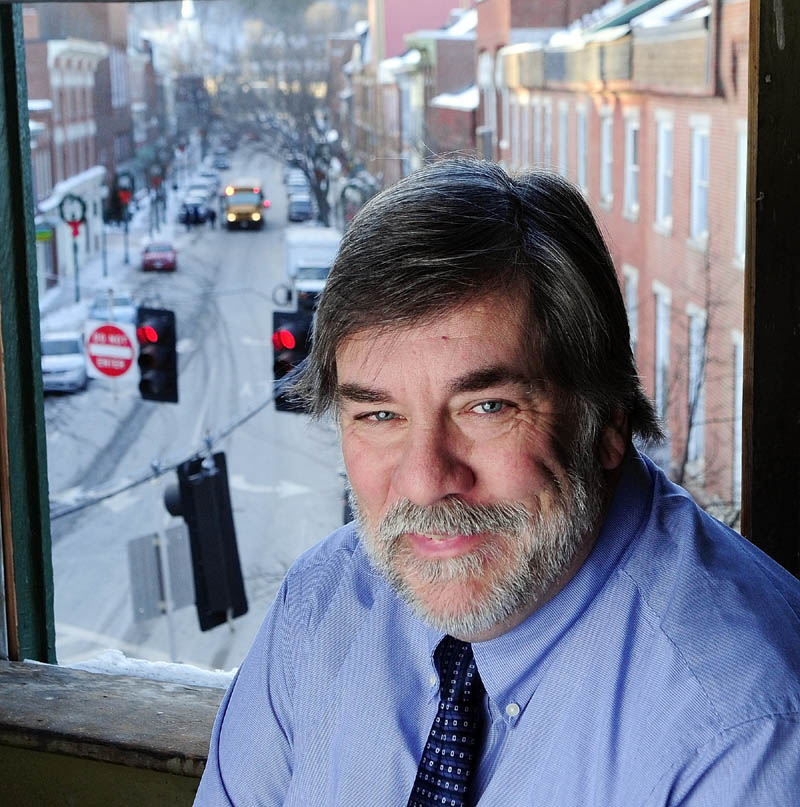GARDINER — The city welcomed its new mayor and councilor while honoring those departing their positions at its inauguration held last week at Gardiner High School.
Mayor Thomas Harnett is replacing Andrew MacLean, who stepped down after six years as mayor.
William Barron was elected as an at-large councilor, replacing Kendall Holmes, and Scott Williams and Robert Johnston were re-elected to their positions on the council.
The council plans to appoint an interim councilor for the District 3 seat left vacant by Harnett, who held the position for a year.
As mayor, Harnett is paid an annual stipend of $1,750.
Harnett’s first foray into city politics came in 2011 as the chairman of a committee asked to recommending whether a crematorium should be built in Oak Grove Cemetery — an issue that generated a strong community reaction from neighbors wanting to keep it out.
The committee recommended allowing the crematorium at the cemetery, but the council voted it down. The crematorium was opened later in the Libby Hill Business Park.
Harnett said that although the issue was more controversial than he was told by MacLean when the mayor asked him to lead the committee, he still enjoyed the work.
“The thing about local politics I should have known, and it’s not rocket science, is it’s very personal,” he said.
Harnett was elected to the City Council as a write-in candidate at the end of 2011. Part-way through his term, MacLean asked what Harnett thought of running for mayor after Maclean stepped down.
Harnett said that after his work on the crematorium committee and the council, the position of mayor seemed like the next logical step for his civic service.
“It’s a challenge I’m looking forward to taking on,” Harnett said.
Harnett is the assistant attorney general in the Natural Resources Division of the Maine Office of the Attorney General. Before that, he was the assistant attorney general for civil rights education and enforcement.
Harnett and his wife, Lisa, have two children: Joe, a sophomore at Gardiner High School; and Eloise, a freshman at Tufts University.
Harnett and his wife moved to their Gardiner home in 1992.
“We thought it would be a nice place to start a family,” he said.
He said that when he and his wife were considering the city, people they knew tried discouraging them from choosing Gardiner. After moving, Harnett said, they found the dissenters to be wrong about the city and its quality of life.
“I think people that don’t know Gardiner have preconceived notions that there’s nothing going on,” he said.
Even so, Harnett acknowledged that the city has a lot to work on, particularly in creating a more thriving downtown and business community.
“The struggle Gardiner is facing, the struggle a lot of towns face, is how do you get people to come downtown instead of the ubiquitous mall?” he said.
With a new steakhouse opening this month and a wine bar set to open this spring, Harnett said he thinks the city is making some strides to improving Water Street.
As mayor and chairman of City Council, Harnett said he’ll do everything in his power to continuing improving the downtown and attracting more businesses to the city, especially in the struggling Libby Hill Business Park.
Harnett said an ongoing challenge for city officials is making sure Gardiner continues to offer essential services to residents while not overburdening them with property taxes.
City Manager Scott Morelli also said that balancing act will be an issue facing the council once budget discussions begin this spring. The councilors will have to decide whether they want to keep taxes flat and cut some services or try to increase revenue with investments, he said.
Another topic on the city’s radar is the possibility of natural gas, Harnett said. Representatives from two competing natural gas companies, Summit Natural Gas and Maine Natural Gas, gave presentations to city councilors at a December meeting. Both said the earliest natural gas could come to Gardiner is 2014.
An upcoming issue the council will weigh in on early this year is a possible ordinance change to allow small livestock in residential areas. The Ordinance Review Committee probably will finalize a proposed ordinance that will be sent to the Planning Board before falling into the laps of Harnett and the councilors.
“There seems to be a growing movement — and it’s not just young people — of people wanting to know where their food comes from,” Harnett said, adding that he’s not sure how the issue will play out in the council.
“I think one of the interesting things about council is you never know where the next controversial issue will come from,” he said.
Paul Koenig — 621-5663
pkoenig@mainetoday.com
Send questions/comments to the editors.


